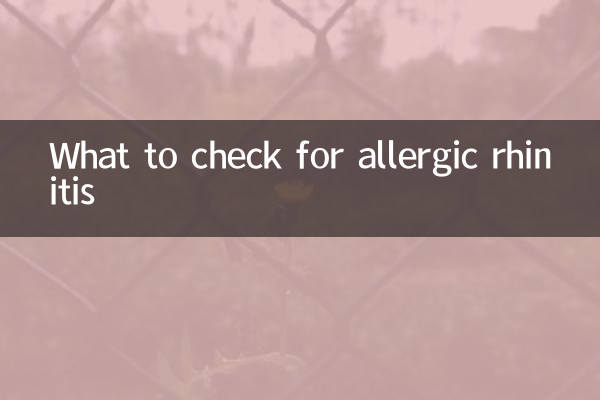What to check for allergic rhinitis?
Recently, allergic rhinitis has become one of the hot topics on the Internet, especially during the alternation of spring and summer, when allergens such as pollen and dust mites increase, and many patients suffer from symptoms such as nasal congestion, runny nose, and sneezing. This article will combine the hot discussions in the past 10 days to sort out the items and precautions that need to be checked for allergic rhinitis, and help you deal with this problem scientifically.
1. Main symptoms of allergic rhinitis

Typical symptoms of allergic rhinitis include:
| Symptoms | Description |
|---|---|
| nasal congestion | Swelling of the nasal mucosa causing difficulty breathing |
| runny nose | Watery nasal discharge, large amount |
| sneeze | Paroxysmal, especially in the morning or after exposure to allergens |
| Itchy nose | Itching in the nasal cavity, which may be accompanied by itching of the eyes |
2. Items that need to be checked for allergic rhinitis
According to recent medical expert advice, the diagnosis of allergic rhinitis usually requires the following tests:
| Check items | purpose |
|---|---|
| Allergen testing | Identification of allergens through skin prick testing or blood IgE testing |
| Nasal endoscopy | Observe whether the nasal mucosa is swollen, pale or has secretions |
| nasal secretion smear | Check the number of eosinophils to assist in the diagnosis of allergic rhinitis |
| Pulmonary function test (if necessary) | Rule out the possibility of asthma |
3. Common allergens in allergic rhinitis
According to hot search data in the past 10 days, the following allergens are the main causes of allergic rhinitis:
| Allergen type | common sources |
|---|---|
| pollen | Spring tree and flower pollen |
| dust mites | Bedding, carpets, plush toys |
| Mold | Fungal spores in moist environments |
| pet dander | Hair and dander from cats, dogs and other pets |
4. How to prevent and relieve allergic rhinitis?
Based on the prevention and control methods hotly discussed by netizens, here are some practical suggestions:
1.Avoid exposure to allergens:Reduce going out or wear a mask, keep indoors clean, and use anti-mite bedding.
2.Medication:Antihistamines (such as loratadine) and nasal steroid sprays (such as budesonide) can relieve symptoms.
3.Immunotherapy:For patients with long-term recurring attacks, desensitization treatment may be considered.
4.Adjustments to lifestyle habits:Enhance immunity, work regularly, and eat a balanced diet.
5. Answers to recent hot questions
According to recent online discussions, the following are some of the issues patients are most concerned about:
| question | answer |
|---|---|
| Is allergic rhinitis hereditary? | There is a hereditary tendency in the family. If parents have the disease, their children are at higher risk. |
| Can allergic rhinitis be cured? | There is currently no cure, but it can be effectively alleviated through allergen control and drug treatment. |
| How to distinguish allergic rhinitis from a cold? | Colds are usually accompanied by fever and general fatigue, while allergic rhinitis is dominated by nasal symptoms |
Summary
Allergic rhinitis is a common disease, and symptoms can be effectively controlled through scientific examination and reasonable prevention and treatment measures. If you suspect that you have allergic rhinitis, it is recommended to go to the hospital for relevant examinations as soon as possible to identify the allergens and develop a personalized treatment plan. It’s the allergy season recently, so taking good protection is key!

check the details

check the details